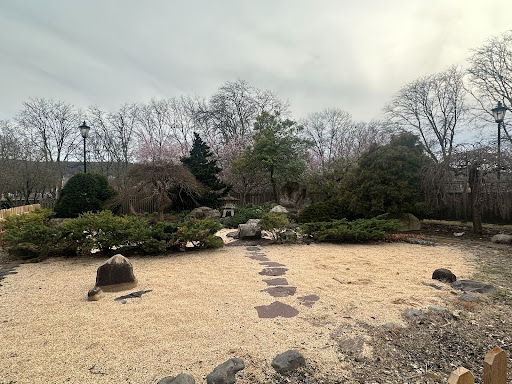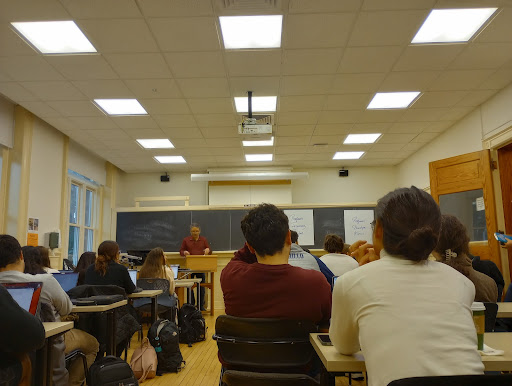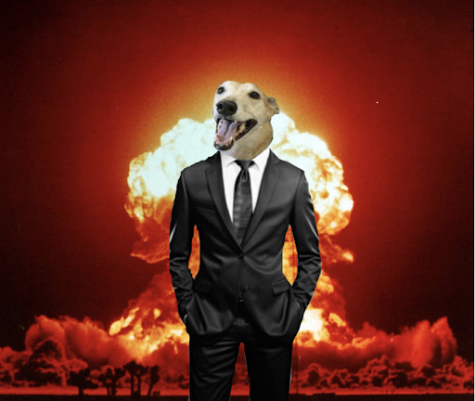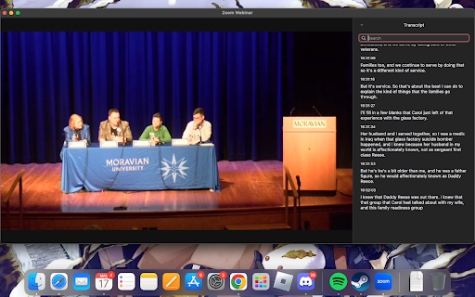Community Engagement in World Affairs: The Russian Invasion and War with Ukraine

At noon on March 9th, the Moravian community gathered around the Peace Pole on North Campus to “Stand for Peace,” in a show of solidarity with the people of Ukraine. Photo courtesy of Staff
Feb. 24, 2022: A climatic date which signaled global disorder, humanitarian concern and economic distraught as Russia began its monstrous invasion on the neighboring nation of Ukraine.
The annexation gained vast and immediate attention globally and became one of the most thunderous and alarming events to occur in recent history. Naturally, with outlets such as Twitter, many individuals witnessed the unadulterated, uncensored harrowing reality of many Ukrainian citizens as videos of Russian air forces dominating the skies and putting residential Ukrainian territory in immense danger were captured and brought to light the depravity of the invasion.
Moravian’s very own Office for Diversity, Equity and Inclusion (DEI) centered Mar. 11’s Friday Forum discussion on “The Russian Invasion and the War with Ukraine.” In this informative discussion panel, professors and staff from the political science department and economics department provided assessments of the many avenues of the invasion itself.
Dr. Faith Okpotor, assistant professor of the political science department, introduced the basic fundamentals of invasion and war with Ukraine. She explained domestic politics of Russian President Vladmir Putin, the ways this conflict is re-contextualizing the international system, and details on the specifics of elements of the invasion from geopolitical context to a postcolonial lens.
Okpotor detailed historical events that led up to the current annexation starting with the Cold War, a 52-year period of geographical tension between the US and the USSR, which disbanded by 1990. Many elements of that period reverberate in the Russian invasion, as the invasion seeks to expand Russia’s realm of influence. She also noted the geographical location of Ukraine and Belarus, a key nation that still maintains close economic ties with Russia. Both countries were once a part of the Soviet Union and gained independence in 1991. The 2014 Ukrainian-Russian conflict complicated the nature of independence and resulted in the Russian invasion of the Crimean peninsula and a territorial divide of the Ukrainian region of Donbass.
Okpotor moved onto the reasons for the war and what the conflict is truly about. Delving into Putin’s motives, she detailed how Putin wants this invasion due to uncertainty as it is surrounded by NATO, nations such as Estonia and Latvia and therefore, does not want Ukraine to get involved with NATO in any capacity. Putin has also expressed the wish to protect Russian citizens in Ukraine; he also claims that Ukraine is not a “real country” for having populations of immigrants that could easily just go back to their own nations. Finally, Putin wants Ukraine to undergo denazification or a “freeing” from its supposed corrupted government.
This invasion is also discussed through its fallout global response where 141 countries that belong to the UN general assembly have condemned the Russian invasion. Moreover, as this situation has been categorized as a humanitarian crisis with over 2.5 million citizens taking refuge in neighboring countries, many countries are lending helping hands and public advocacy to Ukraine.
The US, for example, has responded by supplying Ukraine with Western supplies, security assistance, humanitarian aid and economic sanctions; back in 2014, such economic sanctions had been unsuccessful. Another important measure taken by most nations is the withdrawal from economic relations with Russia; this procedure is being utilized in hopes that Russia’s economy will suffer and put an end to any upcoming war.
Conclusively, Okpotor discussed the effects on the international order and the value of viewing the situation through a postcolonial lens.
The war has reshaped the international system which extends to Russia wanting to restore the old order of Russian influence; this goal of restoration has led the US to start reconsidering Russia’s status within US security. With NATO, Okpotor addressed the miscalculation that the allyship of NATO countries was not strong until this conflict which has been debunked. It has been reported that NATO soldiers have been deployed and every NATO official has said that NATO will defend and support Ukraine in trying to achieve a No-Fly Zone over the nation so the invasion doesn’t escalate to a full-on shooting war.
Through a post-colonial scope, Okpotor implored her audience to notice the contrasting ways in which refugees from Ukraine are treated versus refugees from other conflicts. Even with the United Kingdom taking measures to dismantle bureaucratic practices and open its borders for

refugees, could more be done for Ukrainian refugees than have been done for other refugees in similar situations? She ended her contribution with an excerpt from a speech by Kenya’s UN ambassador Martin Kimani, which slams Putin’s aspirations with this annexation.
Kimani proclaims, “Kenya rejects such a yearning [for domination] pursued by force. We must complete our recovery from the embers of dead empires in a way that does not plunge us back into new forms of domination.”
Dr. Ariel Otruba and Dr. Eva Leeds included instances similar to the current annexation where Russia experienced territorial conflict with the Republic of Georgia in 2008 and Czechoslovakia in the year 1948 and 1968. Otruba detailed the “Russia is Occupant” phrase that was coined due to a televised event where Putin alludes to using hybrid warfare for occupying territories. She shed light on the Russian occupation of Georgia, which parallels much of what the world is witnessing with Ukraine.
Ossetia, formerly a Georgian autonomous community, was the victim of a Russian invasion. Russia had instigated the war on the claim of aggression against South Ossetia and the Russians who occupied the area. Russia, previously a peacemaker in the 1990s for Georgia, had become an instigator for a war against the Georgian government.
In 2008, Ossetia had its boundary lines expanded and a ceasefire ended the war. Russia then signed a series of bilateral agreements which Putin has also signed to the two Ukrainian territories. The impact of this instance in 2008 has also resulted in Russians facing some prejudice within Georgian territories (also known as Russiophobia).
Leeds noted the occupation of the former nation of Czechoslovakia in 1948 and 1968. In 1948, Czechoslovakia was conquered by the Soviet Union. However, 20 years later in 1968, the Soviet Union and three other countries participated in the Warsaw Pact due to fear of a communist collapse in Czechoslovakia. An overnight military invasion resulted from this pact and the four countries involved cracked down on reformists groups trying to eradicate communism.
The discussion panel succeeded in broadening the community’s understanding of the annexation, and the professors and panelists brought forth nuanced insight and reflection on the situation at hand. It brought some much needed light on such a dire dilemma occurring thousands of miles away from us and treated the topic with the utmost care and consideration to Ukraine, its citizens and its refugees.











